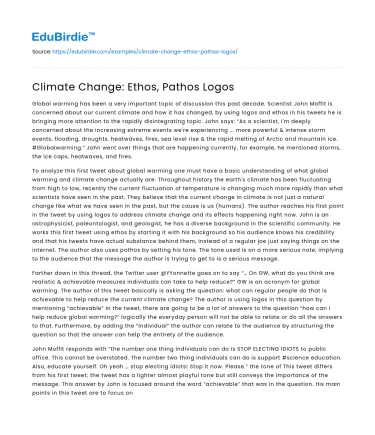Global warming has been a very important topic of discussion this past decade. Scientist John Moffit is concerned about our current climate and how it has changed, by using logos and ethos in his tweets he is bringing more attention to the rapidly disintegrating topic. John says: “As a scientist, I'm deeply concerned about the increasing extreme events we're experiencing ... more powerful & intense storm events, flooding, droughts, heatwaves, fires, sea level rise & the rapid melting of Arctic and mountain ice. #Globalwarming.” John went over things that are happening currently, for example, he mentioned storms, the ice caps, heatwaves, and fires.
To analyze this first tweet about global warming one must have a basic understanding of what global warming and climate change actually are. Throughout history the earth's climate has been fluctuating from high to low, recently the current fluctuation of temperature is changing much more rapidly than what scientists have seen in the past. They believe that the current change in climate is not just a natural change like what we have seen in the past, but the cause is us (humans). The author reaches his first point in the tweet by using logos to address climate change and its effects happening right now. John is an astrophysicist, paleontologist, and geologist, he has a diverse background in the scientific community. He works this first tweet using ethos by starting it with his background so his audience knows his credibility and that his tweets have actual substance behind them, instead of a regular joe just saying things on the internet. The author also uses pathos by setting his tone. The tone used is on a more serious note, implying to the audience that the message the author is trying to get to is a serious message.
Save your time!
We can take care of your essay
- Proper editing and formatting
- Free revision, title page, and bibliography
- Flexible prices and money-back guarantee
Farther down in this thread, the Twitter user @YYonnette goes on to say “… On GW, what do you think are realistic & achievable measures individuals can take to help reduce?” GW is an acronym for global warming. The author of this tweet basically is asking the question: what can regular people do that is achievable to help reduce the current climate change? The author is using logos in this question by mentioning “achievable” in the tweet, there are going to be a lot of answers to the question “how can I help reduce global warming?” logically the everyday person will not be able to relate or do all the answers to that. Furthermore, by adding the “individual” the author can relate to the audience by structuring the question so that the answer can help the entirety of the audience.
John Moffit responds with “the number one thing individuals can do is STOP ELECTING IDIOTS to public office. This cannot be overstated. The number two thing individuals can do is support #science education. Also, educate yourself. Oh yeah … stop electing idiots! Stop it now. Please.” the tone of This tweet differs from his first tweet; the tweet has a lighter almost playful tone but still conveys the importance of the message. This answer by John is focused around the word “achievable” that was in the question. His main points in this tweet are to focus on educating one’s self to understand how to prevent the current climate change on an individual level. As well as “stop electing idiots”. The author uses repetition as he mentions this twice in this tweet, the use of this literary device emphasizes its importance to the author in the context of the text. This idea to me is representing the older political views that climate change is not real and that it is not an issue, and to stop electing people with said views, this point also uses logos to instill the idea that, if people with these views keep getting elected than logically nothing would be done to help reduce or change. I believe this is the point the author is trying to hit because he mentions educating one’s self rather than just going with whatever politicians say.
The use of Aristotle’s three proofs by John in his tweets establishes his heavier tone. But there are always those who don’t get the rhetorical cues. The twitter user @farobag6 tweets on this thread: “But, John as you are aware that the prestigious tRumpf University has determined that science is fake.” The tone of this tweet is much lighter than what we have seen in this thread, this exemplifies the tweet's upbeat and humorous structure. This tweet is about all the accounts the president of the united states has mentioned that climate change is fake, or global warming is fake. The author purposefully misspells what originally would be Trump, and incorrectly capitalizes the letter “r”. This misuse of capitalization is currently a “meme”. The meme in question is the “mocking SpongeBob” meme. Basically, the use of upper and lower case letters in a word or phrase is meant to display sarcasm or guff. The author establishes the use of pathos by appealing to the audience using humor. In this context, the author is making fun of Trump's previous statements on the climate.
After analyzing the use of rhetoric in these selected tweets, I can conclude that the authors of these tweets used multiple rhetorical devices and Aristotle's three proofs: ethos, logos, and pathos, to prompt the audience. John Moffit used logos by using logic like when he mentioned what was happening currently around the world like wildfires. He also uses ethos to appeal to the audience by convincing them of his credibility. The tweets I analyzed achieved their goal of reaching an audience to inform them of the current climate change.






 Stuck on your essay?
Stuck on your essay?

